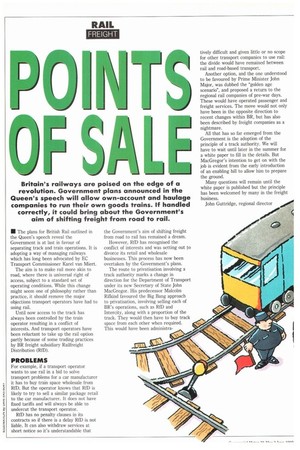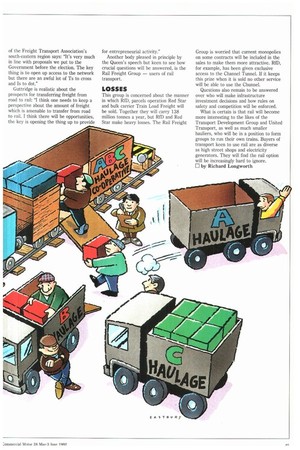Britain's railways are poised on the edge of a revolution.
Page 46

Page 47

If you've noticed an error in this article please click here to report it so we can fix it.
Government plans announced in the Queen's speech will allow own-account and haulage companies to run their own goods trains. If handled correctly, it could bring about the Government's aim of shifting freight from road to rail.
• The plans for British Rail outlined in the Queen's speech reveal the Government is at last in favour of separating track and train operations. It is adopting a way of managing railways which has long been advocated by EC Transport Commissioner Karel van Miert.
The aim is to make rail more akin to road, where there is universal right of access, subject to a standard set of operating conditions. While this change might seem one of philosophy rather than practice, it should remove the major objections transport operators have had to using rail.
Until now access to the track has always been controlled by the train operator resulting in a conflict of interests. And transport operators have been reluctant to take up the rail option partly because of some trading practices by BR freight subsidiary Railfreight Distribution (RID).
PROBLEMS
For example, if a transport operator wants to use rail in a bid to solve transport problems for a car manufacturer it has to buy train space wholesale from RfD. But the operator knows that RID is likely to try to sell a similar package retail to the car manufacturer. It does not have fixed tariffs and will always be able to undercut the transport operator.
RID has no penalty clauses in its contracts so if there is a delay RID is not liable. It can also withdraw services at short notice so it's understandable that the Government's aim of shifting freight from road to rail has remained a dream.
However, RID has recognised the conflict of interests and was setting out to divorce its retail and wholesale businesses. This process has now been overtaken by the Government's plans.
The route to privatisation involving a track authority marks a change in direction for the Department of Transport under its new Secretary of State John MacGregor. His predecessor Malcolm Rifkind favoured the Big Bang approach to privatisation, involving selling each of BR's operations, such as RfD and Intercity, along with a proportion of the track. They would then have to buy track space from each other when required. This would have been administra tively difficult and given little or no scope for other transport companies to use rail: the divide would have remained between rail and road-based transport.
Another option, and the one understood to be favoured by Prime Minister John Major, was dubbed the "golden age scenario", and proposed a return to the regional rail companies of pre-war days. These would have operated passenger and freight services. The move would not only have been in the opposite direction to recent changes within BR, but has also been described by freight companies as a nightmare.
All that has so far emerged from the Government is the adoption of the principle of a track authority. We will have to wait until later in the summer for a white paper to fill in the details. But MacGregor's intention to get on with the job is evident from the early introduction of an enabling bill to allow him to prepare the ground.
Many questions will remain until the white paper is published but the principle has been welcomed by many in the freight business.
John Guttridge, regional director of the Freight Transport Association's south-eastern region says: "It's very much in line with proposals we put to the Government before the election. The key thing is to open up access to the network but there are an awful lot of Ts to cross and Is to dot."
Guttridge is realistic about the prospects for transferring freight from road to rail: "I think one needs to keep a perspective about the amount of freight which is amenable to transfer from road to rail. I think there will be opportunities, the key is opening the thing up to provide for entrepreneurial activity."
Another body pleased in principle by the Queen's speech but keen to see how crucial questions will be answered, is the Rail Freight Group — users of rail transport.
LOSSES
This group is concerned about the manner in which RfD, parcels operation Red Star and bulk carrier Train Load Freight will be sold. Together they will carry 138 million tonnes a year, but RID and Red Star make heavy losses. The Rail Freight Group is worried that current monopolies on some contracts will be included in the sales to make them more attractive, RID, for example, has been given exclusive access to the Channel Tunnel. If it keeps this prize when it is sold no other service will be able to use the Chunnel.
Questions also remain to be answered over who will make infrastructure investment decisions and how rules on safety and competition will be enforced.
What is certain is that rail will become more interesting to the likes of the Transport Development Group and United Transport, as well as much smaller hauliers, who will be in a position to form groups to run their own trains. Buyers of transport keen to use rail are as diverse as high street shops and electricity generators. They will find the rail option will be increasingly hard to ignore.
by Richard Longworth




















































































